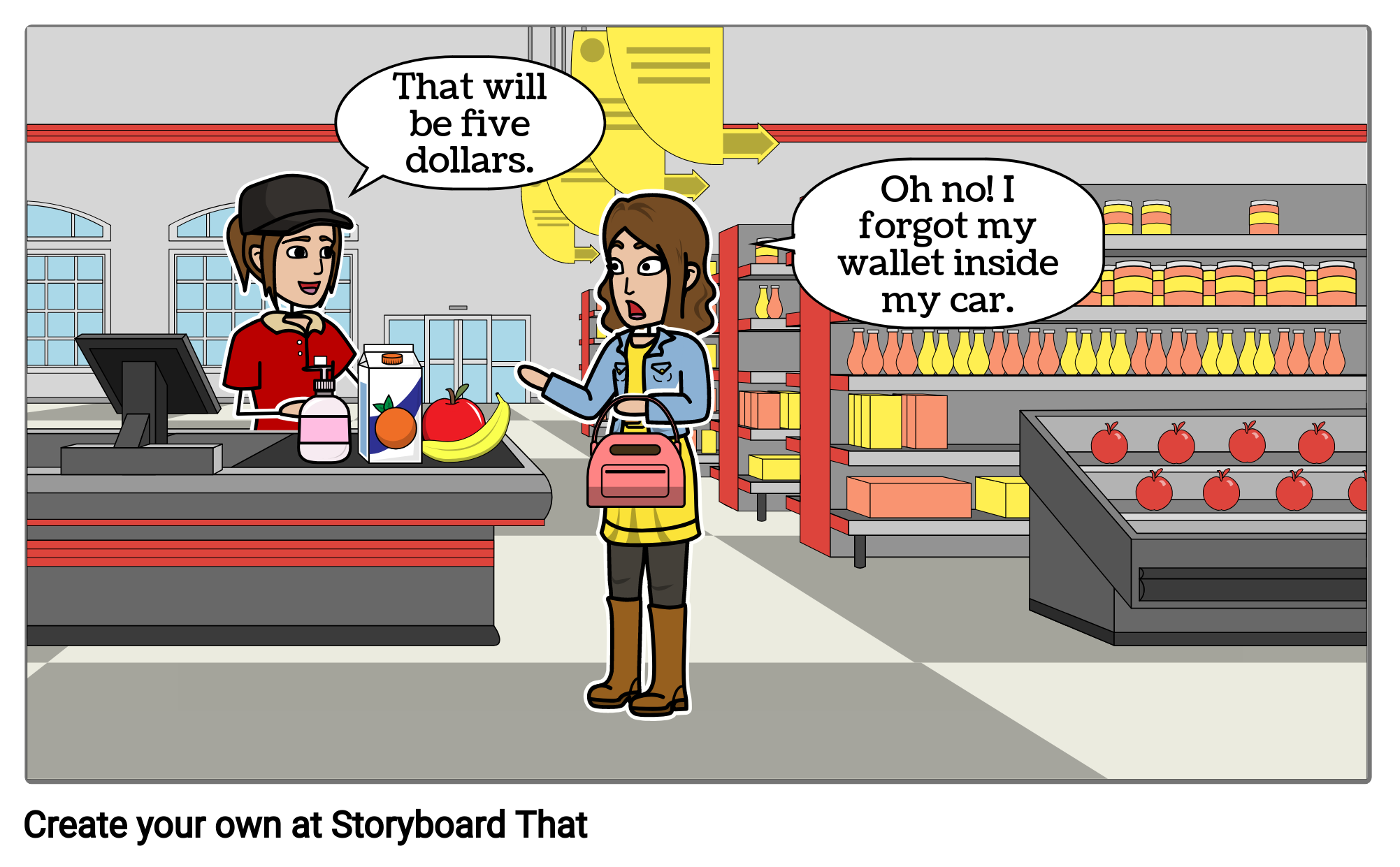LESSON GOAL
Let’s check our lesson goal.
In this material, you will learn the words and phrases that are used when talking about spending and consumerism and express your opinions about specific topics.
In this material, you will learn the words and phrases that are used when talking about spending and consumerism and express your opinions about specific topics.
この教材では、消費や貯金に関連した語彙や表現を学び、特定の話題について意見を述べる練習をします。
PART A_1
Please study the picture below. Then, describe it in as much detail as you can.
PART A_2

| Answer: | |
| . |
PART A_3
Now, let me ask you a question about the picture.
PART A_4
| 1. | Why is the woman shocked? |
| Answer: |
PART A_5
Now, let us review your answers.
(Please review your student’s answers by sending the correct answers in complete sentences. After that, ask your student to read aloud his or her corrected answers.)
PART A_6
Choose the correct meaning of the underlined word in each sentence.
PART A_7
| 1. | She was shocked when she realized that she forgot her wallet at home. |
| a. | [adjective] surprised or upset because something unexpected and usually unpleasant has happened |
| b. | [noun] a type of electricity |
| c. | [adjective] feeling sad and alone |
| 2. | He ran out of money, so his mother lent him some. |
| a. | [noun] the practice of preparing food |
| b. | [noun] the act of running |
| c. | [verb] to use up everything |
| 3. | She already has enough savings to buy her own house. |
| a. | [verb] to pay for something |
| b. | [noun] the money that has been saved |
| c. | [noun] a borrowed money |
| 4. | He can now afford to pay for his loans. |
| a. | [adjective] unhappy |
| b. | [adjective] something that is low in price |
| c. | [verb] to be able to buy or do something because you have enough money |
| 5. | She wants to earn a living as soon as she starts working. |
| a. | [verb] to earn money to be able to buy the things you need |
| b. | [noun] someone or something is alive |
| c. | [noun] something that you ask someone for help |
PART A_8
Now, let us review your answers.
(Please review your student’s answers by sending the correct answers in complete sentences. After that, ask your student to read aloud his or her corrected answers.)
PART B_1
Please construct your own sentences using the following words.
PART B_2
| 1. | shock | Answer: | . | |
| 2. | run out | Answer: | . | |
| 3. | savings | Answer: | . | |
| 4. | afford | Answer: | . | |
| 5. | earn a living | Answer: | . |
PART B_3
Now, let us review your answers.
(Please review your student’s answers by sending the correct answers in complete sentences. After that, ask your student to read aloud his or her corrected answers.)
PART C_1
Please complete each sentence by choosing the correct answer in the box below.
PART C_2
| earn a living | savings | shock |
| afford | run out | money |
| 1. | He still can’t ____________ to buy a new phone. |
| 2. | He has no ____________ left after spending it on useless things. |
| 3. | He was ____________ when he found out that the food price has increased. |
| 4. | He can’t spend too much money because he must ____________. |
| 5. | Her friend has ____________ of money and is asking to let her lend some. |
PART C_3
Now, let us review your answers.
(Please review your student’s answers by sending the correct answers in complete sentences. After that, ask your student to read aloud his or her corrected answers.)
PART D_1
Let’s talk. Please answer the questions by stating your opinions.
PART D_2
| 1. | Some people say that it’s okay to spend too much money. What do you think about that? |
| Answer: | |
| 2. | It is better to go to the mall when prices are on sale. Do you agree or disagree? |
| Answer: |
PART E_1
Now, I will ask you the following questions. You may ask questions, too.
PART E_2
| 1. | Why is saving money important? |
| Answer: | |
| 2. | How do you save money? |
| Answer: | |
| 3. | What are the three things that you think money cannot buy? |
| Answer: | |
| 4. | Where do you usually spend your money on, food or clothes? |
| Answer: | |
| 5. | Have you experienced running out of money? |
| Answer: | |
| 6. | Do you compare prices when you go shopping? |
| Answer: | |
| 7. | Do you go shopping when prices are on sale? Why or why not? |
| Answer: |
REVIEW AND FEEDBACK
Now, let us review the things that you learned in this lesson.
ではこのレッスンで学んだことを振り返りましょう。
(Please give a short feedback on how your student did on your class.)
| Grammar 文法 |
Pronunciation 発音 | Vocabulary 単語 |
Comprehension 理解 |
|
|---|---|---|---|---|
 GOOD GOOD |
文法の誤りはほとんどなく、完全な文章で話すことができる | ほとんどの単語をはっきりと正しく発音することができる | 習った表現を適切に使うことができる | 文章を理解し、質問に正しく答えることができる |
 FAIR |
文法の誤りはあるが、完全な文章で話すことができる | 発音の練習が必要な言葉がいくつかある | たまにミスはあるが、習った表現を適切に使うことができる | 文章を完全に理解するのは難しく、質問に正しく答えられないときもある |
 POOR |
文章で話すのは難しく、単語だけで話すことができる | 発音の練習が必要である | 習った単語と表現を少しだけ使うことができる | 文章を理解するのは難しく、質問に答えるのは難しい |
レッスン教材に関するアンケートのお願い
レッスン教材の改善・拡充を図ることを目的とし、アンケートを実施しております。
以下のURLからアンケートにお答えいただき、 ご意見・ご要望をお聞かせください。
アンケートはこちら